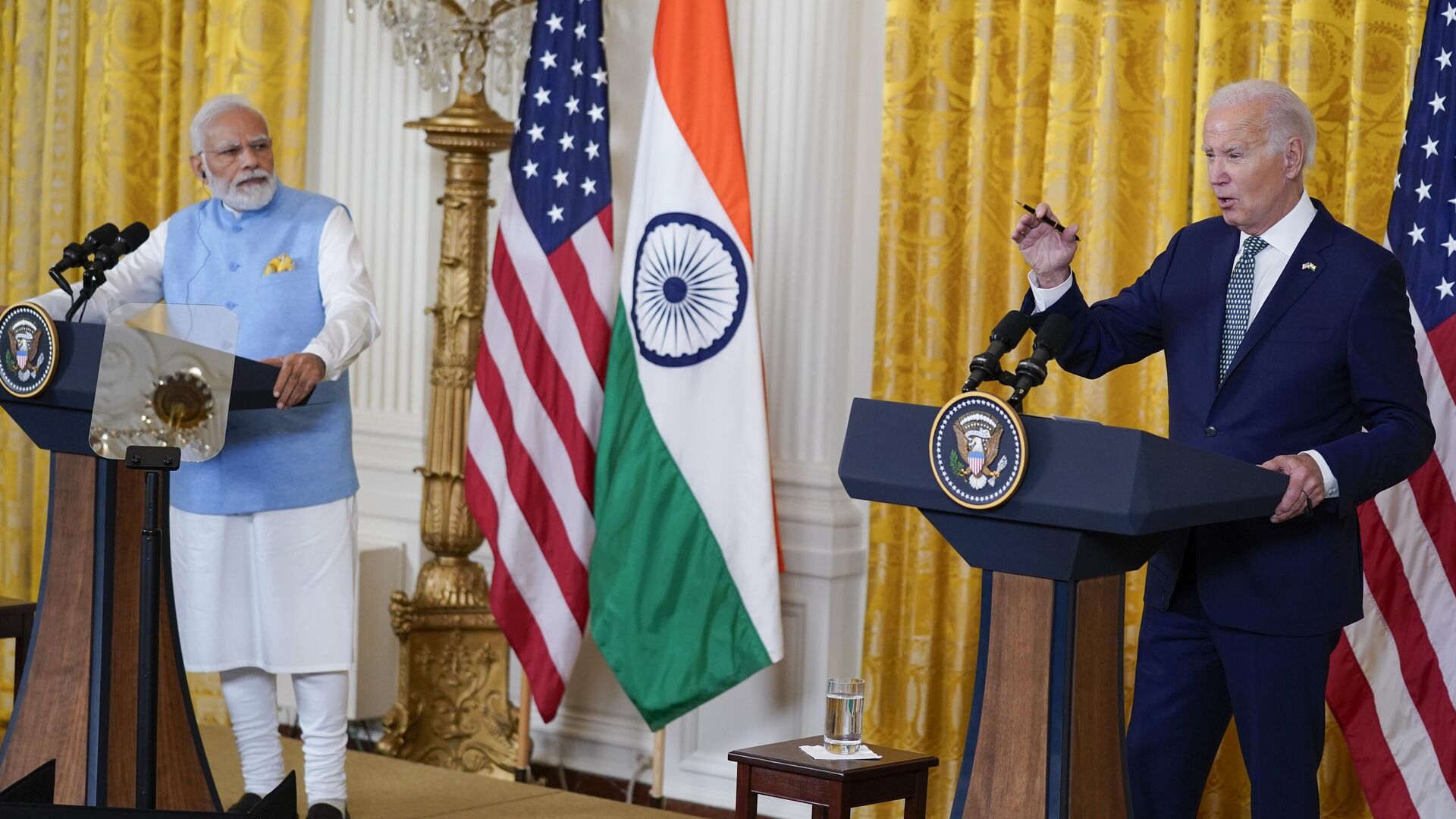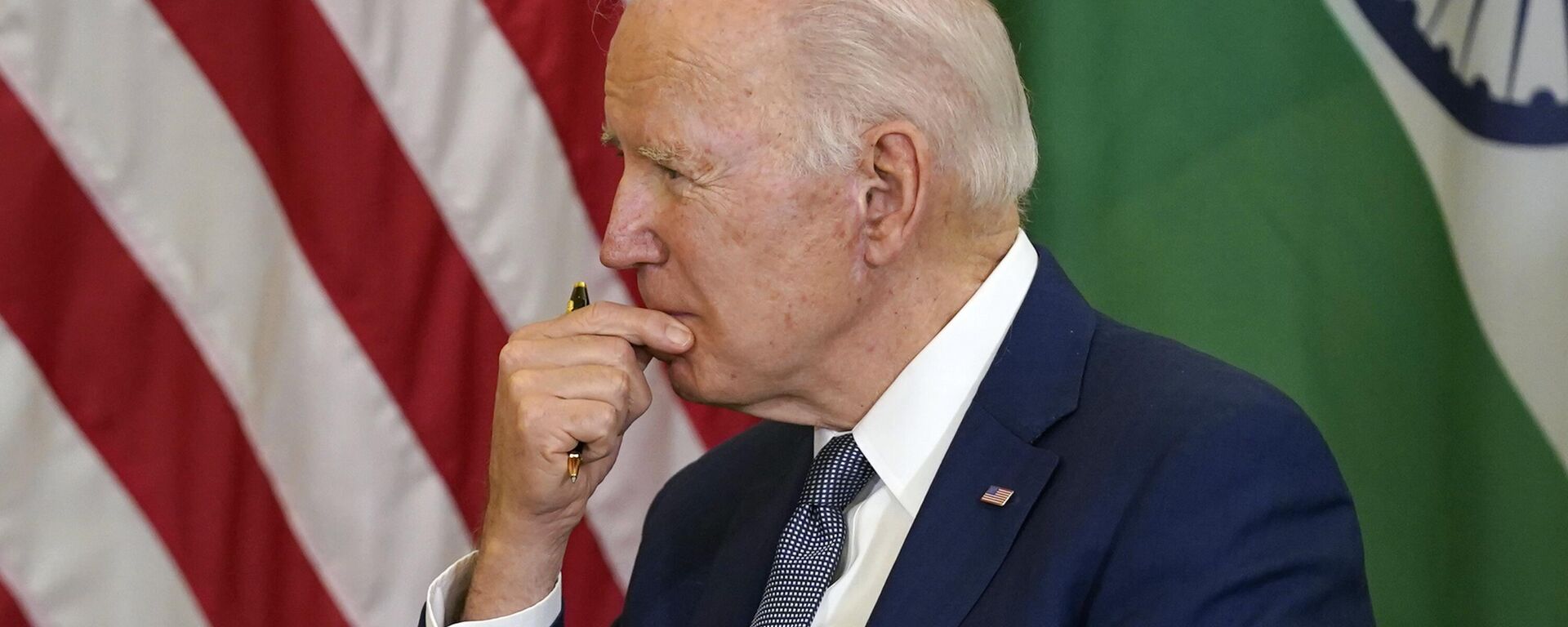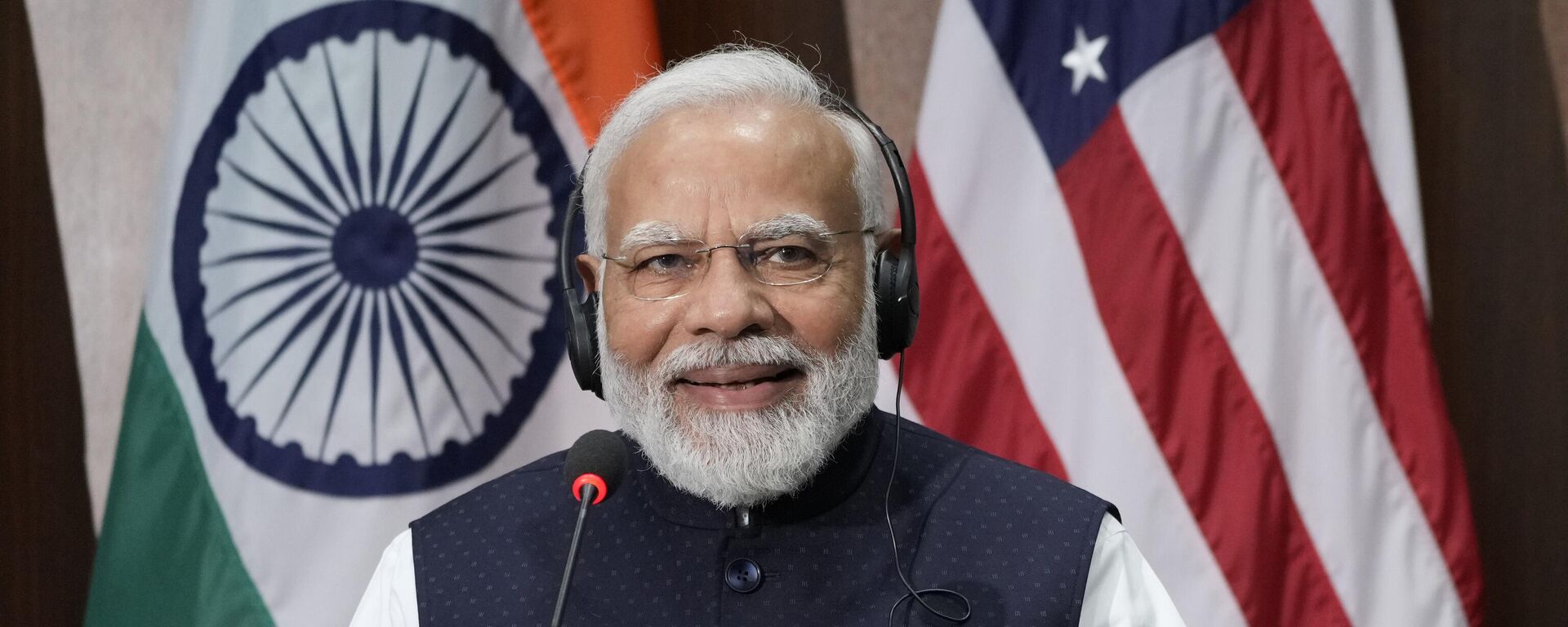https://sputniknews.in/20230623/us-exploiting-indias-vulnerabilities-on-china-ex-envoy-on-modi-biden-summit-2644342.html
US Exploiting India's Vulnerabilities on China: Ex-Envoy on Modi-Biden Summit
US Exploiting India's Vulnerabilities on China: Ex-Envoy on Modi-Biden Summit
Sputnik India
The United States (US) has been “exploiting” India’s vulnerabilities vis-à-vis China to gain an increasing foothold in the Indian Ocean Region (IOR)
2023-06-23T18:22+0530
2023-06-23T18:22+0530
2023-06-23T18:29+0530
sputnik opinion
india
us
narendra modi
joe biden
indian ocean
china
russia
ukraine
mq-9b reaper
https://cdn1.img.sputniknews.in/img/07e7/06/17/2647318_0:0:3072:1728_1920x0_80_0_0_0d1a88af2901057fb7fca5256a75fc78.jpg
The United States has been “exploiting” India’s vulnerabilities vis-à-vis China to gain an increasing foothold in the Indian Ocean Region (IOR), a former Indian Ambassador has told Sputnik after formal consultations between Prime Minister Narendra Modi and President Joe Biden at the White House.New Delhi and Beijing are involved in a deadly military faceoff in the eastern Ladakh region since 2020. The military tensions have spilled over into other areas, with New Delhi stating that peace and tranquillity at the border form the basis of stable bilateral ties with Beijing.Ahmed underlined that the interests of both India and China in the Indian Ocean were more or less the same, including maintaining the security of shipping lanes to ensure an unrestricted flow of energy and trade.The ex-diplomat stated that the US, under its Indo-Pacific Strategy, has “dragged” India to the Western Pacific, where Washington has been involved in a geopolitical confrontation with Beijing as Asia’s biggest economy challenges American pre-eminence.He underlined that New Delhi’s main security interest lie at its territorial borders, where the US has little role to play.India’s Ongoing Alignment With US ‘Deeply Concerning’The remarks come against the backdrop of the India-US joint statement after the Modi-Biden meeting welcomed New Delhi’s role as a “hub for maintenance and repair for forward deployed US Navy assets”.Despite professing a long-held commitment to strategic autonomy, India has signed four “foundational” pacts with the US -- General Security of Military Information Agreement (GSOMIA), Basic Exchange and Cooperation Agreement (BECA), Communications Compatibility and Security Agreement (COMCASA), and the Logistics Exchange Memorandum of Agreement (LEMOA).These are the foundational agreements that any country must sign in order to get access to advanced American technology. LEMOA allows for navies from both countries to access ports in the other country.He pointed out that Indian vessels would have little utility whatsoever in accessing American ports under the arrangement, given New Delhi’s security and economic interests lie in its immediate and extended neighborhood.Importantly, Ahmed said that the US won’t budge to pressure India in the future if New Delhi doesn’t agree to its (US) security policy.He pointed towards a 2021 incident when the US Navy conducted freedom of navigation operations (FONOP) in India’s Exclusive Economic Zone (EEZ) near Lakshadweep, provoking a diplomatic protest from New Delhi.However, the former diplomat made an important qualification to his statement.Ahmed said that India won’t compromise on its strategic autonomy despite all the efforts by the US and other western efforts.‘US Gains More Than India’Commenting about the broader outcomes of the visit, Ahmed reckoned that Washington has been working towards two “long-term objectives”— incrementally bringing India into the broad Western alliance and increase its defense dealings with India.He said that the Biden administration has been trying to "massage the ego" of the Indian Prime Minister.The US has made no secret about its intention to replace Russia as India’s biggest source of weapons. Significantly, New Delhi’s defense imports from the US have risen to $20 billion in 2020 from nearly zero 20 years ago.In the lead-up to Prime Minister Modi and President Biden’s meeting, India and the US announced a pact between General Electric (GE) and India's state-backed Hindustan Aeronautics Limited (HAL) to potentially manufacture jet engines in India, an initiative on Critical and Emerging Technologies (ICET) and a deal on General Atomics MQ-9B HALE drones, which will be assembled in India.The joint statement said that the jet engine deal would “enable greater transfer of US jet engine technology than ever before”.But Ahmed said that there are “legitimate concerns” in India about the transfer of technology (ToT) part despite optimism expressed by the leaderships of the two nations.The ex-diplomat said that New Delhi would “gain little” from the visit, despite all the “hype” in Indian media.The joint statement also noted that "Air India’s historic agreement with Boeing to acquire more than 200 American-made aircraft," a deal reportedly valued at over $70 billion.Biden has said that the pact would create jobs in 44 American states.Ahmed noted that in terms of incoming investments, New Delhi has gained little in "qualitative terms".'Russia Would Continue to be India's Foremost Defense Supplier'Ahmed said that Moscow would continue to remain New Delhi's top weapons' supplier despite ongoing efforts to replace Russian companies in Indian defense supply chains.He said that Russian defense systems such as S-400, artillery, aircraft and tanks would continue to remain the mainstay of Indian forces.Moscow supplied around 45 percent of India's overall defense needs in 2017-2021 period, as per estimates.Meanwhile, Moscow has reiterated its confidence in expanding its military-technical cooperation (MTC) with New Delhi.
https://sputniknews.in/20230601/sl-kanthan-us-not-interested-in-indias-strategic-autnonomy-2278320.html
https://sputniknews.in/20230622/unlike-us-indias-national-security-not-premised-on-rivalry-with-china-academic-2611378.html
india
us
indian ocean
china
russia
ukraine
indo-pacific
Sputnik India
feedback.hindi@sputniknews.com
+74956456601
MIA „Rossiya Segodnya“
2023
Dhairya Maheshwari
https://cdn1.img.sputniknews.in/img/07e6/0c/13/138962_0:0:641:640_100x100_80_0_0_2cb44360dbcdf6d84bf4b299cd045917.jpg
Dhairya Maheshwari
https://cdn1.img.sputniknews.in/img/07e6/0c/13/138962_0:0:641:640_100x100_80_0_0_2cb44360dbcdf6d84bf4b299cd045917.jpg
News
en_IN
Sputnik India
feedback.hindi@sputniknews.com
+74956456601
MIA „Rossiya Segodnya“
Sputnik India
feedback.hindi@sputniknews.com
+74956456601
MIA „Rossiya Segodnya“
Dhairya Maheshwari
https://cdn1.img.sputniknews.in/img/07e6/0c/13/138962_0:0:641:640_100x100_80_0_0_2cb44360dbcdf6d84bf4b299cd045917.jpg
modi us visit, modi press conference, modi in us, modi news, india us relations, india us defense deal, india us news, india us drone deal, india us joint statement
modi us visit, modi press conference, modi in us, modi news, india us relations, india us defense deal, india us news, india us drone deal, india us joint statement
US Exploiting India's Vulnerabilities on China: Ex-Envoy on Modi-Biden Summit
18:22 23.06.2023 (Updated: 18:29 23.06.2023) Prime Minister Narendra Modi and President Joe Biden held delegation-level and restricted talks at the White House on Thursday. Trade and investment, defense, security, energy, climate change, and people-to-people ties were major areas of focus during the talks.
The
United States has been “exploiting”
India’s vulnerabilities vis-à-vis China to gain an increasing foothold in the Indian Ocean Region (IOR), a former Indian Ambassador has told Sputnik after
formal consultations between Prime Minister Narendra Modi and President Joe Biden at the White House.
“I am very strongly of the view that the US has been taking advantage of our concerns relating to China. There has been a significant opening of the Indian Ocean to the US and other western navies under their respective Indo-Pacific strategies,” remarked Ambassador(retired) Talmiz Ahmed, a former Indian diplomat and a strategic affairs expert.
New Delhi and Beijing are involved in a
deadly military faceoff in the eastern Ladakh region since 2020. The military tensions have spilled over into other areas, with New Delhi stating that peace and tranquillity at the border form the basis of stable bilateral ties with Beijing.
Ahmed underlined that the interests of both India and China in the Indian Ocean were more or less the same, including maintaining the security of shipping lanes to ensure an unrestricted flow of energy and trade.
The ex-diplomat stated that the US, under its Indo-Pacific Strategy, has “dragged” India to the Western Pacific, where Washington has been involved in a geopolitical confrontation with Beijing as Asia’s biggest economy challenges American pre-eminence.
He underlined that New Delhi’s main security interest lie at its territorial borders, where the US has little role to play.
“The US intentions should have been clear from the fact that their Secretary of State Antony Blinken was trying to mend fences with China just ahead of Prime Minister Modi’s visit to Washington. It just wants to aggravate tensions between India and China to serve its own geopolitical goals,” Ahmed reckoned.
India’s Ongoing Alignment With US ‘Deeply Concerning’
The remarks come against the backdrop of the India-US joint statement after the Modi-Biden meeting welcomed New Delhi’s role as a “hub for maintenance and repair for forward deployed US Navy assets”.
Despite professing a long-held commitment to
strategic autonomy, India has signed four “foundational” pacts with the US -- General Security of Military Information Agreement (GSOMIA), Basic Exchange and Cooperation Agreement (BECA), Communications Compatibility and Security Agreement (COMCASA), and the Logistics Exchange Memorandum of Agreement (LEMOA).
These are the foundational agreements that any country must sign in order to get access to advanced American technology. LEMOA allows for navies from both countries to access ports in the other country.
Ahmed said that American naval access to Indian ports could be “deeply concerning”, given the US’ National Security Strategy institutionalizing its rivalry with China.
He pointed out that Indian vessels would have little utility whatsoever in accessing American ports under the arrangement, given New Delhi’s security and economic interests lie in its immediate and extended neighborhood.
Importantly, Ahmed said that the US won’t budge to pressure India in the future if New Delhi doesn’t agree to its (US) security policy.
He pointed towards a 2021 incident when the US Navy conducted freedom of navigation operations (FONOP) in India’s Exclusive Economic Zone (EEZ) near Lakshadweep, provoking a diplomatic protest from New Delhi.
However, the former diplomat made an important qualification to his statement.
Ahmed said that India won’t compromise on its strategic autonomy despite all the efforts by the US and other western efforts.
“The idea of strategic independence is not a choice for India. It is not an option. It is deeply ingrained in the Indian psyche. There is nothing that can happen in the world that can change that,” Ahmed stated.
‘US Gains More Than India’
Commenting about the broader outcomes of the visit, Ahmed reckoned that Washington has been working towards two “long-term objectives”— incrementally bringing India into the broad Western alliance and increase its defense dealings with India.
“Most of the hype around the visit has come overwhelmingly from the United States. This is a very rare occurrence. Normally the receiving country places a degree of importance. So, here we can straightaway say that the Americans are placing a very unique importance to the visit,” he underlined.
He said that the Biden administration has been trying to "massage the ego" of the Indian Prime Minister.
The US has made no secret about its intention to replace Russia as India’s biggest source of weapons. Significantly, New Delhi’s defense imports from the US have risen to $20 billion in 2020 from nearly zero 20 years ago.
In the lead-up to Prime Minister Modi and President Biden’s meeting, India and the US announced a pact between General Electric (GE) and India's state-backed Hindustan Aeronautics Limited (HAL) to
potentially manufacture jet engines in India, an initiative on Critical and Emerging Technologies (ICET) and a deal on General Atomics MQ-9B HALE drones, which will be assembled in India.
The joint statement said that the jet engine deal would “enable greater transfer of US jet engine technology than ever before”.
But Ahmed said that there are “legitimate concerns” in India about the transfer of technology (ToT) part despite optimism expressed by the leaderships of the two nations.
“The United States does not transfer technology, which has been a problem with it for the last 40 years. It has never transferred state-of-the-art technology,” he said.
Ahmed pointed out that the decision to transfer technology would ultimately lie in the hands of American companies and not the government.
The ex-diplomat said that New Delhi would “gain little” from the visit, despite all the “hype” in Indian media.
“Be it in terms of access to Indian bases or generating defense and other commercial orders from India, the US has gained more in strategic and commercial sense from the visit,” he reckoned.
The joint statement also noted that "Air India’s historic agreement with Boeing to acquire more than 200 American-made aircraft," a deal reportedly valued at over $70 billion.
Biden has said that the pact would create jobs in 44 American states.
Ahmed noted that in terms of incoming investments, New Delhi has gained little in "qualitative terms".
'Russia Would Continue to be India's Foremost Defense Supplier'
Ahmed said that Moscow would continue to remain New Delhi's
top weapons' supplier despite ongoing efforts to replace Russian companies in Indian defense supply chains.
He said that Russian defense systems such as S-400, artillery, aircraft and tanks would continue to remain the mainstay of Indian forces.
Moscow supplied around 45 percent of India's overall defense needs in 2017-2021 period, as per estimates.
Meanwhile, Moscow has reiterated its confidence in expanding its military-technical cooperation (MTC) with New Delhi.
Russian deputy foreign minister Sergei Ryabkov said on Friday that Russia would continue to bolster ties with India regardless of “all the intrigues of Washington”.




